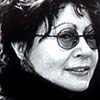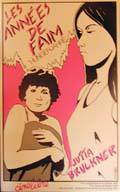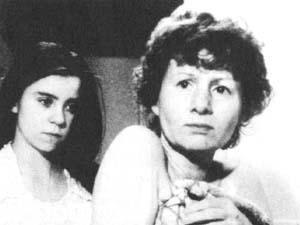 Born 1941, Jutta Brückner studied political science, philosophy and
history (Ph.D.). She has had no formal training in film, and also scripts
for Völker Schlöndorff and Ula Stöckl.
Born 1941, Jutta Brückner studied political science, philosophy and
history (Ph.D.). She has had no formal training in film, and also scripts
for Völker Schlöndorff and Ula Stöckl.
As to a particular relation between feminism and film form: woman's historical
and cultural oppression does not just reveal itself not only in our familiar
exclusion from the forms of exchange in a public sphere erected by men.
Also it especially reveals itself in the deformation, renunciation and
incapacitation of our physical integrity and perception. This has most
clearly affected sexuality, but also looking. Through the look, a person
establishes space relations, and without space there is no time. Space-time-looking
mean something else to women than to men. In film especially, these three
elements of perception come together. Moreover, film allows us women to
represent our disrupted physical integrity, whereas literature restricts
physical presence to the imagination. In filmic representation, a vision
of what undisrupted physical integrity might be emerges. And that vision
presents itself not only to our imagination but also to our looking. Film
for me offers the sole medium in which we can explore our collective labor
of mourning for the cultural paralyzing of our bodies, our eyes, and our
space-time relations. The goal: recuperating the means to reconstruct
symbolically. This throws into question filming's own premises. Film becomes
filming’s content, not as the burden or joy of a tradition, within
which you are confined to sitting for hours in movie theatres. It’s
not as "real life," the way the French New Wave formulated it.
I mean recuperating our capacity to look.
This has nothing to do with a specific style. There is no one feminist
style. Nor can stylistic "innovations" be introduced like exotic
commodities or clothes fashions. I am talking about new questions and
new points of departure.
My films are all autobiographical. Autobiographical motivations counter
the false generalizations into which we have been molded for years. These
generalizations are false for men too; they simply don't realize it. We
women tend to notice them more because our individuality simply cannot
be contained within these generalizations. We must not just constitute
images out of the small banalities of daily life. To do only that is false
realism. Rather, we must find new forms to narrate private life, to recognize
collective gestures in the most banal ones. For example, the way a wife
hands her husband a cup of tea in the morning. To what extent does this
collective gesture destroy me because it has nothing to do with me and
makes me into a trained dog? I am trying to disrupt the habitual ways
in which people see.
copyright Jump Cut: A Review of Contemporary Media, 1982, 2005

HUNGERJAHRE (YEARS OF HUNGER)
1979, 100 min, 35mm, b/w, dist: Basis Film (Berlin)
Primé à Sceaux 1980, Festival du Film de Femmes (Bruxelles)
1981
Set in the sexually and politically restrictive fifties, the film reconstructs
the memories of an adolescent girl who refuses to become a woman. She
finds herself so alienated from her body and her emotions that she finally
attempts suicide.

"J'ai voulu montrer comment une jeune fille - ce qui était notre cas à toutes dans les années cinquante - arrivait déjà déformée au seuil de l'existence adulte, du fait d'un certain type d'éducation qui vous détruit et qui peut avoir une issue mortelle."
 Hungerjahre
is a film about being young in the 1950s.Thirteen-year-old Ursula is the
only child of lower-middleclass parents who want to give their daughter
a better life through social advancement. The world of the adults is that
of the German postwar boom (Wirtschaftswunder): plentiful food, housing,
clothes, and the restoration of traditional values. Ursula is confronted
with the political lies of her materialist father and the sexual antagonism
of her mother. Whatever Ursula does, her mother’s anxiety follows
her everywhere, stifling her daughter’s hunger for life every step
of the way. Ursula begins a dangerous separation between her inner and
outer lives.
Hungerjahre
is a film about being young in the 1950s.Thirteen-year-old Ursula is the
only child of lower-middleclass parents who want to give their daughter
a better life through social advancement. The world of the adults is that
of the German postwar boom (Wirtschaftswunder): plentiful food, housing,
clothes, and the restoration of traditional values. Ursula is confronted
with the political lies of her materialist father and the sexual antagonism
of her mother. Whatever Ursula does, her mother’s anxiety follows
her everywhere, stifling her daughter’s hunger for life every step
of the way. Ursula begins a dangerous separation between her inner and
outer lives.
 HITLER
CANTATA
HITLER
CANTATA
D 2005, 114 min, ov-vo D, st-ond E
Aspiring young composer Ursula Scheuner (Lena Lauzemis) has two passions in her life: Hitler and music. She is obsessed with the Führer and hopes to become a famous composer.
After being rejected by the music conservatory, she uses her connection with Gottlieb Just (Arnd Klawitter), a high ranking SS colonel and her fiancé, to get an assistant position to famous composer Hanns Broch (Hilmar Thate). Broch is secretly opposed to the Nazi regime and struggles with the moral dilemma of having to compose a cantata for Hitler´s 50th birthday.
At a remote Finnish estate, Hanns and Ursula are thrown together while working on the composition. They fight not only about their opposing ideologies, but also against the romantic feelings that have evolved between them and threaten to take over their lives.
"This film is about the power of music. It
demonstrates how music can become a catalyst to a higher awareness of
your surroundings and how it can make you examine your own personal convictions!"

"Hitler sells. But Jutta Brueckner does not
merely exploit the thrill of the evil. I have rarely seen a story told
in such a complex way as Jutta Brueckner does in her latest film."
has coproduced German and international movies for cinema and television
i.e Lars von Trier: Dancer in the Dark, Michael Haneke: Caché, Patrice Chéreau: Intimacy.
"HITLER CANTATA shows how much the fascist regime uses the power
of eroticism and deduction. Brueckner gives an emotional and intellectual
insight into the psychic dimension of totalitarism. This film is important."
"Jutta Brueckner's HITLER CANTATA makes us
understand the hysteria surrounding Hitler. Her analysis of the social
infantilism is ironic, but not without compassion and her glimpse on those,
who fell for the dictator, is laconic, without sentimentality."